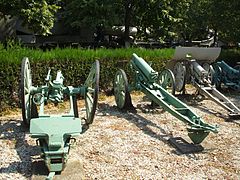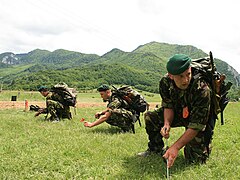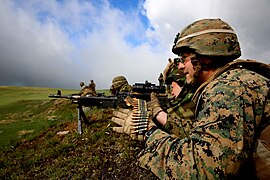Vânători de munte
This article needs additional citations for verification. (February 2017) |
| Mountain Huntsmen | |
|---|---|
| Vânători de munte | |
 | |
| Active | Since 1916 |
| Country | |
| Branch | |
| Type | Mountain troops |
| Role | Close-quarters combat Cold-weather warfare Forward observer Mountain warfare Raiding Reconnaissance Urban warfare |
| Size | Two brigades |
| Garrison/HQ | 2nd Mountain Troops Brigade - Brașov 61st Mountain Troops Brigade - Miercurea Ciuc |
The Vânători de Munte (Romanian pronunciation: [vɨnəˈtorʲ de ˈmunte], English translation: Mountain Huntsmen) are the elite mountain troops of the Romanian Land Forces. They were first established as an independent Army Corps in 1916 during World War I, and became operational in 1917 under Corpul de Munte designation.[1]
History
The Romanian vânători de munte saw action in World War II on the Eastern Front in some of the harshest battles — including the sieges of Sevastopol and Stalingrad — where their performance lived up to their reputation: virtually all their commanders from brigade level and up received the Knight's Cross of the Iron Cross, with general Mihail Lascăr being the first foreigner to receive Oak Leaves on 22 November 1942 (see List of foreign recipients of the Knight's Cross). The greatest single achievement of the vânători de munte was the capture of Nalchik on 2 November 1942, the farthest point of the Nazi Germany advance into the Caucasus. This victory earned Romanian Brigadier General Ioan Dumitrache the Knight's Cross of the Iron Cross.[2] After the coup d'état of 23 August 1944, the vânători de munte fought on the Soviet side, notably in the Tatra Mountains.[3]
After the end of the war, one of the first measures taken by the Soviets in occupied Romania was to disband the mountain troops. Shortly after the Soviet occupation troops left Romania in 1958, the vânători de munte were re-established again as a distinct branch of Communist Romania's People's Ground Forces.
There are currently two brigades operational, one subordinated to the 1st Infantry Division (the 2nd Mountain Troops Brigade "Sarmizegetusa"), and another one subordinated to the 4th Infantry Division (the 61st Mountain Troops Brigade "General Virgil Bădulescu"). Mountain troops units participated in the occupation of Iraq and Afghanistan.[4]
Image gallery
-
On the Eastern Front, 1941
-
Vânători de munte during a military competition
-
Troops from the 2nd and 61st Mountain Troops Brigade during a military competition
-
A soldier with the 17th Vânători de munte Battalion fires an M240B machine gun with a U.S. Marine of the Black Sea Rotational Force, during a live-fire exercise in the Carpathian Mountains, 2014
-
An Arctic Cat Prowler used by the 21st Mountain Hunters Battalion "General Leonard Mociulschi" during a training exercise, 2017


See also
- List of mountain warfare forces
- Mountain warfare
- Ski warfare
- French Chasseurs Alpins
- German Gebirgsjäger
- Italian Alpini
- Polish Podhale rifles
- 10th Mountain Division (United States)
References
- ^ "Vânători de munte". www.forter.ro (in Romanian). Romanian Land Forces. Retrieved 3 November 2022.
- ^ Spencer C. Tucker, World War II: The Definitive Encyclopedia and Document Collection (5 volumes), ABC-CLIO, 2016, p. 1422
- ^ Axworthy, Mark; Scafeș, Cornel I.; Crǎciunoiu, Cristian (1995). Third axis, fourth ally: Romanian armed forces in the European war, 1941-1945. London: Arms and Armour. p. 64. ISBN 1-85409-267-7. OCLC 32552622.
- ^ Forter.ro:La kilometrul zero al infanteriei
External links
- (in Romanian) Presentation of the vânători de munte on the Land Forces' website
- (in English) Unofficial page
- (in English) "The Mountain Troops"








